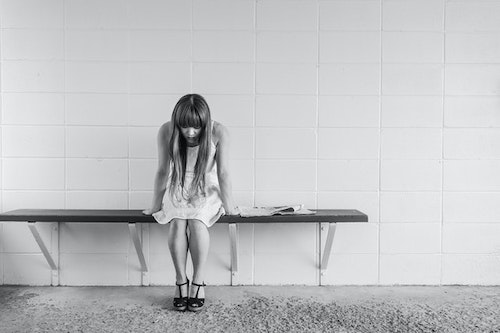Depression Treatment
Feel Like You Can Never Catch A Break?
 Have you been feeling down lately? You might be dissatisfied with your job, financial situation or some other life circumstance. No matter what you do, things never seem to get any better. As a result, you might have given up on the idea of improving your situation.
Have you been feeling down lately? You might be dissatisfied with your job, financial situation or some other life circumstance. No matter what you do, things never seem to get any better. As a result, you might have given up on the idea of improving your situation.
Are feelings of hopelessness making you listless or lethargic? You might be neglecting your health. If you’ve been eating poorly, not sleeping enough or failing to get any exercise, your energy stores may be depleted, making you feel even more unmotivated. You might also have turned to addictive substances or risky behaviors out of a desire for a quick fix.
Are your relationships less satisfying than you would like? Maybe it seems like other people don’t understand you or don’t care about you, making you feel lonely, angry or sad. You might not have the energy to interact much with others, so you isolate yourself, causing you to pass up activities that have the potential to lift your mood.
Having often felt sad and dejected lately, you might wonder if you have clinical depression. Even if your distress has reached diagnosable levels, that doesn’t mean you’re destined to live a life of misery. Whether you’re clinically depressed or have just been feeling down, it’s possible to raise your spirits and take actions that can improve your situation.
We All Feel Sad At Times In Our Lives
Everyone feels unhappy sometimes, but some people feel sad more often or more intensely. Many people are good at hiding their feelings, so many of the people around you might seem to be fine. Yet, in reality, depression is extremely common, affecting more than 17 million adults in the United States¹.
 For many people, the stage for depression is set during childhood. Your family may have been well-meaning. They may even have provided the best experiences and possessions for you, but if they failed to relate to you emotionally or made you feel unimportant, you may have internalized those feelings. If you were treated poorly as a child, you likely won’t expect anything better from your adult friends or partner. As such, you might continue to have toxic relationships that reinforce your depressive feelings.
For many people, the stage for depression is set during childhood. Your family may have been well-meaning. They may even have provided the best experiences and possessions for you, but if they failed to relate to you emotionally or made you feel unimportant, you may have internalized those feelings. If you were treated poorly as a child, you likely won’t expect anything better from your adult friends or partner. As such, you might continue to have toxic relationships that reinforce your depressive feelings.
Another common cause of depression is our natural desire as humans to stand out and make a name for ourselves. As children, we depend on attention from others for our survival, and that need to feel special doesn’t go away. As adults, we learn that the world isn’t all about us, and that we are not as special as we had hoped. These revelations leave a psychological void that seems impossible to fill, however hard we try.
Many people assume their external circumstances must change and that the people around them must like and understand them before they can ever be happy. Fortunately, that isn’t true. By turning your attention inward, you can transform your reactions to life’s stressors and recognize opportunities for happiness that were there all along.
Depression Treatment Can Help You Help Yourself
You may have felt sad and powerless for so long that those emotions have become habitual. When you’re feeling down, it may be hard to tell whether the source of those feelings lies in the world around you or within your own mind. Your emotions may try to tell you that the world is against you, but that may not be entirely true.
It’s very difficult to see the impact your psychology is having on your thoughts and behaviors without an outside perspective. That’s why psychotherapy can be such an effective treatment for depression. As your therapist, I can help you understand why you think and feel the way you do. By exploring your history, I can help you to interpret it and shed light on things about yourself you never noticed before.
 For example, we might discover that you have developed a victim mentality, or that you are overly hard on yourself when you make a mistake. In either of those cases, you might have concluded that nothing can be done. By understanding where hurtful beliefs like these come from, you can notice them when they arise and decide whether they’re worth following.
For example, we might discover that you have developed a victim mentality, or that you are overly hard on yourself when you make a mistake. In either of those cases, you might have concluded that nothing can be done. By understanding where hurtful beliefs like these come from, you can notice them when they arise and decide whether they’re worth following.
There will always be things in life you can’t control, but you probably have more control over your life than you realize. For example, if you’re unemployed and haven’t gotten any job interviews yet, you are probably feeling discouraged. You then stop applying for jobs that seem out-of-reach, creating a self-fulfilling prophecy. Therapy for depression can help you recognize and mitigate these kinds of psychological traps.
Depression treatment can help you recognize unhelpful tendencies in every area of your life, including your relationships. For example, you might discover in therapy that childhood abuse or neglect created a lasting fear of rejection. So as an adult, you might tend to overreact when your partner does something you interpret as uncaring or dismissive. Rather than reacting with the emotional baggage of the past, I can teach you how to base your response in your present reality. By better understanding yourself and your background, you’ll be able to relate with others more effectively and more calmly. You’ll also be better able to recognize toxic relationships for what they are, and consider avoiding or ending them.
We are naturally social creatures, so interpersonal skills are important. However, you may have become overly dependent on the attention or affection of others, putting your emotional well-being into others’ hands. To help you strike a better balance between social connectedness and self-sufficiency, I will encourage you to find internal sources of satisfaction.
Life is full of ups and downs. Therapy can help you weather the inevitable storms, appreciate the good things in your life, and seize opportunities for growth. When you recognize your potential and take greater responsibility for your happiness, your depression symptoms will begin to ease. The hopelessness, isolation, defeat and depression you once felt will begin to dissolve, leaving hope, connectedness and contentedness in their place.
Hesitant About Seeking Depression Treatment?
No one cares about me, and I don’t think you’ll be any different.
 Just like many other assumptions, the thought that no one cares about you is hardly true. Therapy will allow you to explore how and why you started to think that way, and introduce you to new possibilities. I care enough to listen to you with an open heart and an open mind. I don’t expect you to trust me right away. Yet, once you see that I genuinely care about you and am here to help, it will be easier for you to overcome the doubts, interpersonal problems or self-esteem issues you may be dealing with.
Just like many other assumptions, the thought that no one cares about you is hardly true. Therapy will allow you to explore how and why you started to think that way, and introduce you to new possibilities. I care enough to listen to you with an open heart and an open mind. I don’t expect you to trust me right away. Yet, once you see that I genuinely care about you and am here to help, it will be easier for you to overcome the doubts, interpersonal problems or self-esteem issues you may be dealing with.
I’m such a failure. I’m not sure I am even worth the effort.
If you are searching for a depression therapist, you probably care enough about yourself and your life to consider making some improvements. If you are indeed ready to change your life, I can serve as a catalyst and help you start moving in the right direction. I can’t make the required changes for you. However, in finding an effective therapist for depression, you will be giving yourself access to the insights, strategies and support with which I help can you recognize your value and potential.
Nothing in my life will ever change.
Therapy can help you recognize how thoughts like these may be holding you back just as much as your current circumstances. I can help you connect the dots between your past experiences and current thoughts and behaviors, freeing you from the assumptions, doubts and negativity of your past. If you can change your attitude, you can change your life.
Take Charge Of Your Own Life
A better life is waiting for you on the other side of sadness; psychological therapy for depression can help you realize it. Contact me to get help dealing with your depression and to start the process of freeing yourself from sadness and powerlessness.
¹ https://www.nimh.nih.gov/health/statistics/major-depression.shtml








